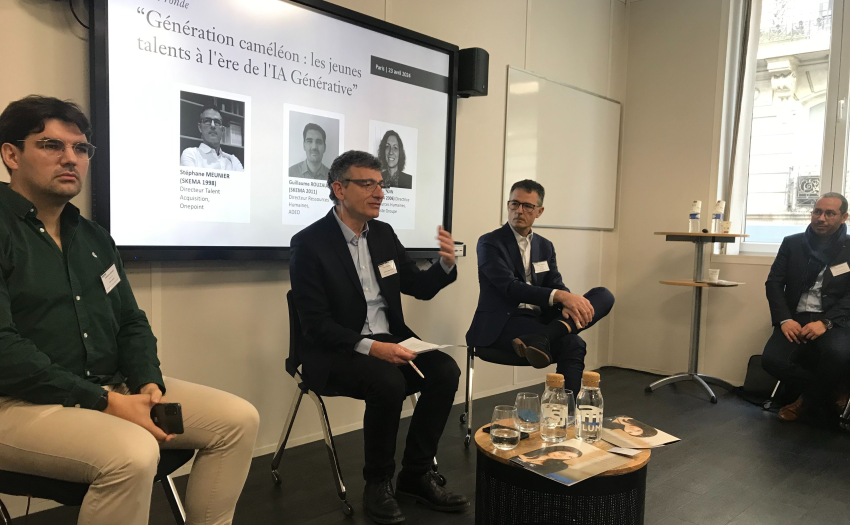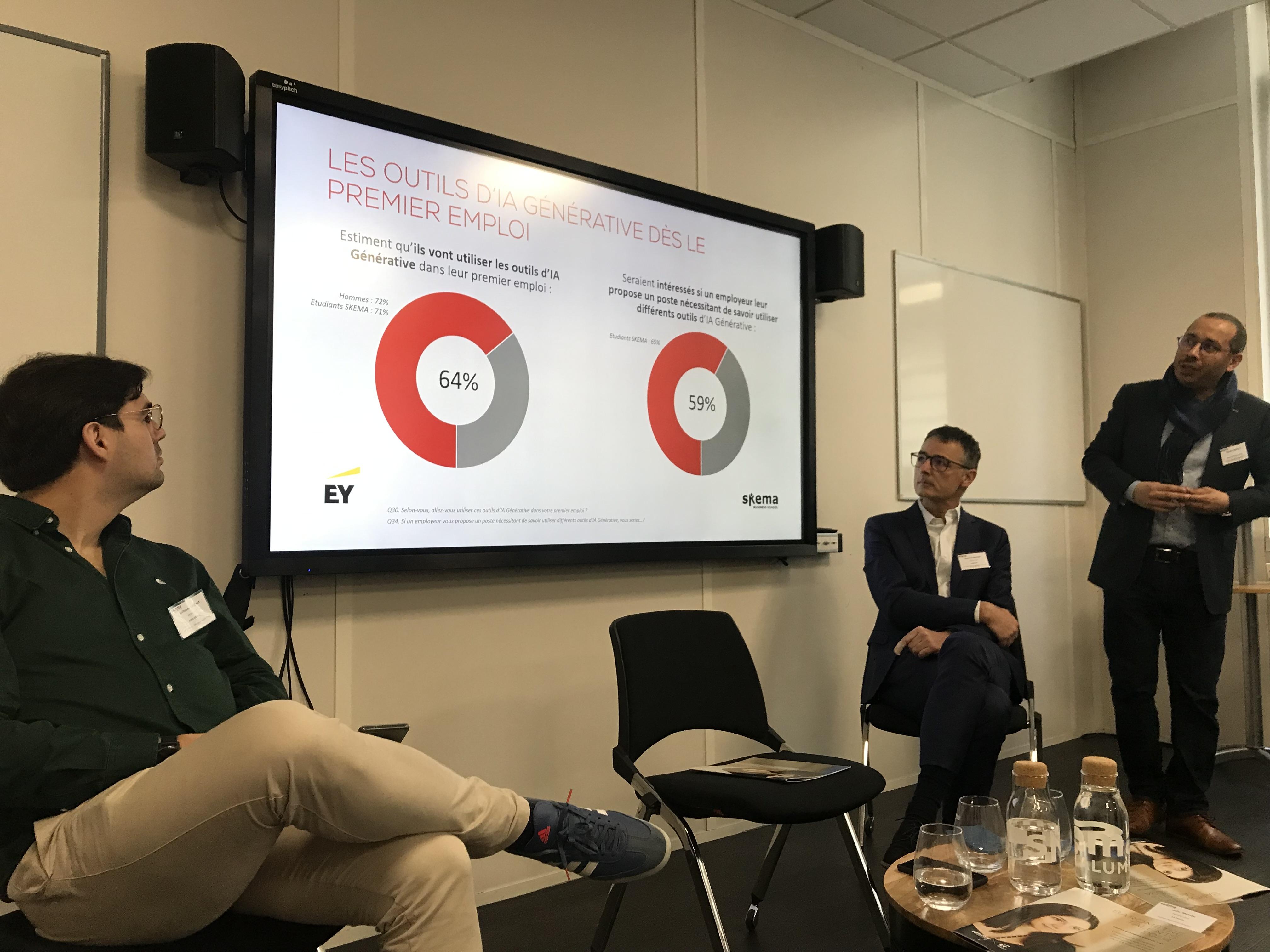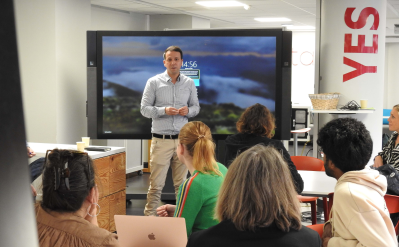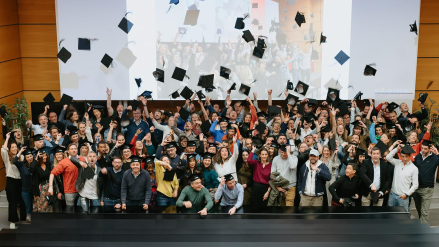News

Generative AI: are we entering a new era?
A look back at the round table organized last April in Paris "Generation chameleon: young talent in the age of generative AI". Nearly 50 graduates were welcomed to the Espace Cléry to present the results of the 2024 SKEMA x EY barometer on the expectations of young talent vis-a-vis their future employers, and in particular on the subject of generative AI in business.
We would like to thank our two alumni experts for their testimonials Stéphane Meunier ( SKEMA 1998) Talent Acquisition Director, ONEPOINT and Guillaune Rouzaud (SKEMA 2011), Human Resources Director, ADEO, alongsideAmine Ezzerouali, Director of the MSc International HR and Performance Management as Keynote and Francis Wolinski, Associate Professor at SKEMA Business School, Master of Science Artificial Intelligence for Business Transformation, as Moderator.
Starting with the observation that generative AI is making its mark on student and professional life, the stakeholders focused their reflections on two major themes: Should we be afraid of it? What are its limits?
AI in higher education: between opportunities and challenges
As a pre-proposal, Amine Ezzerouali shared some figures on usage: 4 out of 5 students use generative AI, 45% of them on an almost daily basis. 85% of students have already tried AI at least once*.
This use in higher education raises a fundamental question about the principle of evaluation.
Today, AI is becoming more sophisticated as it becomes more widespread. While the barometer shows a growing awareness of the benefits of AI as a working tool, there is a certain fear in terms of employment.
64% of students believe they will be using generative AI tools in their first job. At the same time, 64% say they are training themselves in these new uses, showing that there is a teaching deficit in higher education on how to apprehend this new tool.
Generation Z and AI: the HR challenge
While covid has turned the world of work upside down, for the highly digitalized Generation Z, the strongest impact has been moral and ethical. Contrary to what one might think, Generation Z is concerned about loyalty. Money is not the main concern for Gen Z, who are more interested in benefits, working environment, employer brand, commitment and corporate culture.
Nonetheless, studies show that the primary causes of departure among young people are to be found in their immediate work environment. A problem with their boss or team. "There ' ssomething very egocentric about it. If there's a good atmosphere among colleagues in the unit where the person is working, it doesn't matter if there are ethical or management problems at the macro level, day-to-day comfort is satisfied. The main reason for leaving is the prospect of career advancement. "We're talking about salary, responsibility and, above all, knowledge and learning," explains Amine Ezzerouali.

Business: AI, a growth gas pedal
Understanding artificial intelligence techniques and applying them to the digital transformation of businesses is crucial.
The 3Ds mark the advent of generative AI: Democratization, Diversification and Dynamics. " Democratization means that, overnight, these technologies can be used by people with no prior knowledge," explains Francis Wolinski.
Diversification takes into account the tool's infinite range of uses. All company functions are impacted. " The tool is extremely dynamic and quick to learn," he continues.
Responsible use and practices: the importance of a framework
"The majority of young people are aware that AI is a work tool, a vector for transforming companies... but I also think that these young people are quite demanding of concrete things," develops our alumnus Stéphane Meunier, Talent Acquisition Director at ONEPOINT. "While today everyone is talking about and doing AI, we're still in the early stages in terms of support in companies.
Like everyone else, we woke up in 2022 with a leap that no one had seen coming. We appointed a "Chief AI" to set up an approach within our company. The most important thing is to be your own laboratory and create the most beneficial AI tool for your structure."
For Guillaume Rouzaud, Human Resources Director, ADEO, the importance of setting up a framework is paramount: "We worked with the ethics teams, the cybersecurity teams and the legal teams, to set up a framework and a guideline via a charter. The pitfalls of generative AI are its ease of use and infinite usecases.
Today, internally, it's important to lay down rules: redefine how AI is to be used in the various Business Units, and explain what absolutely must not be done. For example, we can't put sensitive data into an external generative AI interface, because we know that an OpenAI will then train its new algorithms on the basis of this user data. This may seem obvious, but many people don't realize it. We need to offer a safe environment so that there's no impact for the customer or the company."
AI and HR: Man or machine?
The use of AI in HR departments means that much larger volumes of data can be processed. However, a highly ethical approach is required when the machine makes choices about human value.
"We were approached by a startup that offered us a tool to screen CVs exponentially," reports Stéphane Meunier. "In a large-scale recruitment process, for 1,000 positions, we could receive around 10,000 resumes filtered thanks to AI. We stopped because we were unable to explain the algorithm and its biases. In terms of image, the consequences were too serious. Yes, we could have assigned our teams to other tasks, but it was too risky to entrust that to AI."
AI should be an assistant to develop work values, but should not replace or surpass humans.
AI: human memory and training tool
Today, to avoid the loss of knowledge linked to a generational transition of talent, AI offers various opportunities to ensure and facilitate transmission.
"Why not plug a generative AI into the knowledge and processes I've formalized? Once the knowledge is captured, anyone can access it. I'm not going to say that we're creating a virtual clone of my colleague before he retires, but an AI can explain how I manage my department, the main principles, what to look out for, and so on. Today, the first tests are convincing. An always-available conversational assistant is ready to provide the necessary answers," explains Guillaume Rouzaud.
This approach creates an encyclopedia of processes that can be consulted at any time. However, a number of questions arise regarding its use: should there be several chatbots per theme or profession? Should there be just one chatbot? Should everyone have access?
Once again, AI must not replace man, but accompany him. It must adapt to the needs of the company, rather than the company seeking to exploit all its capabilities... at the risk of losing itself.
You can read the full report on the Talent 2024 barometer by clicking below.
*(Studies conducted on 1,200 people, ⅔ of whom are SKEMA students, with the remaining third made up of students with similar backgrounds from a business school).




